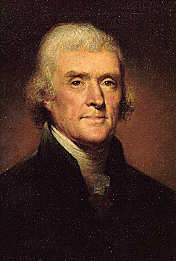
SmithDRay's
4th of July
Page

![]()

Thomas Jefferson and this Ole Hippy say:
"Have a GREAT 4th of July!!!!"

Near the bottom of the page is an updated section on the Liberty Bell
![]()





Our flag is a symbol that celebrates our freedom
![]()





...And serves as a reminder of our victories
![]()















4th of July and Patriotism
Have you ever wondered what happened to the 56 men who signed the Declaration of Independence? Here's what happened to some of them!
Five signers were captured by the British as traitors, and tortured before they died.
Twelve had their homes ransacked and burned. Two lost their sons serving in the Revolutionary Army; another had two sons captured.
Nine of the 56 fought and died from wounds or hardships of the Revolutionary War.
They signed and they pledged their lives, their fortunes, and their sacred honor.
What kind of men were they? Twenty-four were lawyers and jurists. Eleven were merchants, nine were farmers and large plantation owners; men of means, well educated.
But they signed the Declaration of Independence knowing full well that the penalty would be death if they were captured.
Carter Braxton of Virginia, a wealthy planter and trader, saw his ships swept from the seas by the British Navy. He sold his home and properties to pay his debts, and died in rags.
Thomas McKeam was so hounded by the British that he was forced to move his family almost constantly. He served in the Congress without pay, and his family was kept in hiding. His possessions were taken from him, and poverty was his reward.
Vandals or soldiers looted the properties of Dillery, Hall, Clymer, Walton, Gwinnett, Heyward, Ruttledge, and Middleton.
At the battle of Yorktown, Thomas Nelson Jr., noted that the British General Cornwallis had taken over the Nelson home for his headquarters. He quietly urged General George Washington to open fire. The home was destroyed, and Nelson died bankrupt.
Francis Lewis had his home and properties destroyed. The enemy jailed his wife, and she died within a few months.
John Hart was driven from his wife's bedside as she was dying. Their 13 children fled for their lives. His fields and his gristmill were laid to waste. For more than a year he lived in forests and caves, returning home to find his wife dead and his children vanished. A few weeks later he died from exhaustion and a broken heart.
Norris and Livingston suffered similar fates. Such were the stories and sacrifices of the American Revolution. These were not wild-eyed, rabble-rousing ruffians. They were soft-spoken men of means and education. They had security, but they valued liberty more.
Standing tall, straight, and unwavering, they pledged: "For the support of this declaration, with firm reliance on the protection of the divine providence, we mutually pledge to each other, our lives, our fortunes, and our sacred honor."
They gave you and me a free and independent America. The history books never told you a lot about what happened in the Revolutionary War. We didn't fight just the British. We were British subjects at that time and we fought our own government! Some of us take these liberties so much for granted, but we shouldn't.
So, take a few minutes while enjoying your 4th of July holiday and silently thank these patriots. It's not much to ask for the price they paid. Remember: freedom is never free!
INDEPENDENCE BELL
(July 4, 1776)
Anonymous
In the quaint old Quaker town,
And the streets were rife with people
Pacing restless up and down;
People gathering at the corners,
Where they whispered each to each,
And the sweat stood on their temples
With the earnestness of speech.
As the bleak Atlantic currents
Lash the wild Newfoundland shore,
So they beat against the State House,
So the surged against the door;
And the mingling of their voices
Made the harmony profound,
Till the quiet street of Chestnut
Was all turbulent with sound.
“Who is speaking?” “What’s the news?”
“What of Adams?” “What of Sherman?”
“Oh, God grant they won’t refuse!”
“Make some way there!” “Let me nearer!”
“I am stifling!” “Stifle, then!
When a nation’s life’s at hazard,
We’ve no time to think of men!”
While all solemnly inside,
Sat the “Continental Congress,”
Truth and reason for their guide;
O’er a simple scroll debating,
Which, though simple it might be,
Yet should shake the cliffs of England
With the thunders of the free.
Sat the bellman, old and gray;
He was weary of the tyrant
And his iron-sceptered sway;
So he sat, with one hand ready
On the clapper of the bell,
When his eye could catch the signal,
The expected news to tell.
Through all its lengthy line,
As the boy beside the portal
Hastens forth to give the sign!
With his little hands uplifted,
Breezes dallying with his hair –
Hark! With deep, clear intonation,
Breaks his young voice on the air.
Whilst the boy cries joyously;
“Ring!” he shouts, “Ring, grandpapa!
Ring! Oh, ring for Liberty!”
Quickly, at the given signal,
The old bellman lifts his hand;
Forth he sends the good news, making
Iron music through the land.
How the old bell shook the air,
Till the clang of freedom ruffled
The calmly gliding Delaware!
How the bonfires and the torches
Lighted up the night’s repose,
And from flames, like fabled Phoenix,
Our glorious liberty arose!
Hushed is now its clamorous tongue;
But the spirit it awakened
Still is living – ever young:
And when we greet the smiling sunlight
On the Forth of each July,
We will ne’er forget the bellman
Who, betwixt the earth and sky,
Rang out, loudly, “Independence!”
Which, please God, shall never die!
Bell Facts:
Keep the Great American DREAM
alive for all of us and celebrate FREEDOM,
FAMILY, and
FRIENDS!!!




There was tumult in the city,
“Will they do it?” “Dare they do it?”
So they surged against the State House,
Far aloft in that high steeple
See! See! The dense crowd quivers
Hushed the people’s swelling murmur,
How they shouted! What rejoicing!
That old State House bell is silent,
A bell, later to become known as the "Liberty Bell" was cast in London, England, for the Pennsylvania State House. It cracked soon after it arrived in Philadelphia. Local craftsmen John Pass and John Stow then cast a new bell in 1753, using metal from the English bell. Their names are inscribed on the front of the bell, along with the city and the date.
The bell continued to be used, however, by 1846 a thin crack began to affect the sound of the bell. The bell was repaired in 1846 and rang for a George Washington birthday celebration, but the bell cracked again and has not been rung since. No one knows for sure why the bell cracked either time.
The bell weighs approximately 2000 pounds and is made of 70% copper, 25% tin, with small amounts of lead, zinc, arsenic, gold, and silver. It is on display near Independence Hall in Philadelphia, Pennsylvania and still hangs from what is believed to be its original wooden yoke, made from American elm, also known as slippery elm.
![]()
Notes on the above verse: While the author is unknown, some information about the circumstances surrounding the event are known:
At the time the Declaration of Independence was adopted on the evening of July 4, 1776, the event was announced by ringing the bell in the State House of Philadelphia, Pennsylvania. The venerable bellman had his grandson stand at the door of the hall, to await the announcement of the event by the door keeper. When the grandson was given the signal, he rushed to where he could see his grandfather, and shouted, "Ring, ring, ring!"
Inscribed on the "old State House bell" was the following: "Proclaim Liberty Throughout the Land, to All the Inhabitants Thereof!"
What a fitting symbol to help us recall our "American Liberty!"
![]()
